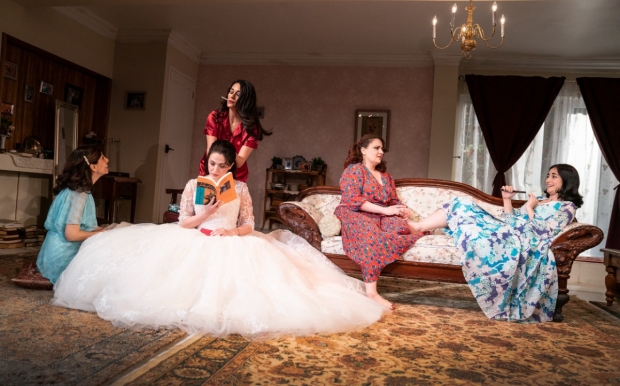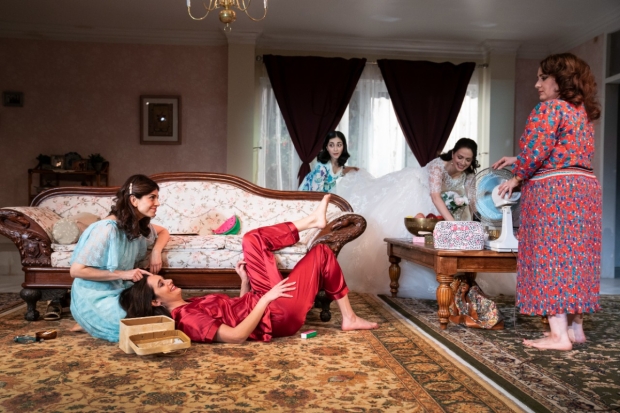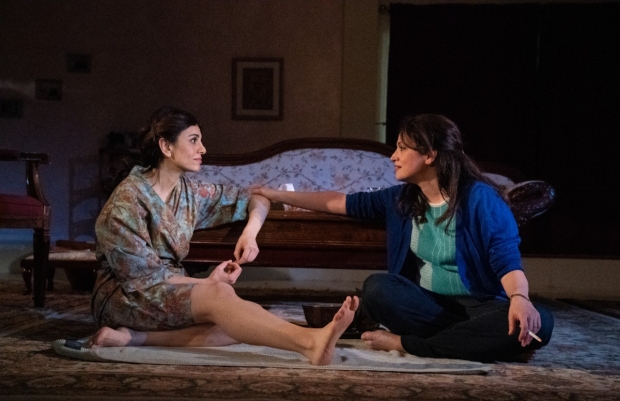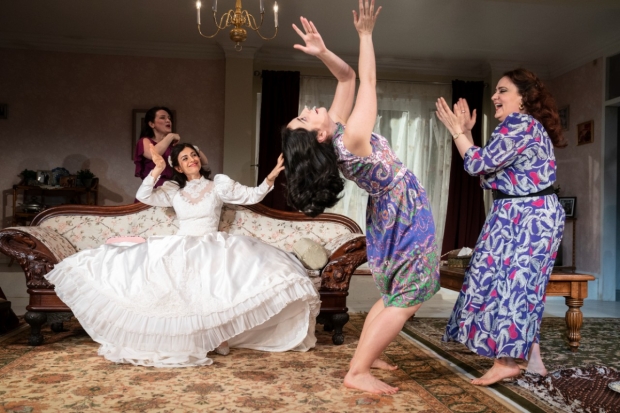Review: In Wish You Were Here, the Politics of Female Friendship Are More Complex Than Revolution

(© Joan Marcus)
"Being your best friend was my whole personality," says one young woman to another in Sanaz Toossi's gently perceptive new play Wish You Were Here. It's about the most comprehensive statement that can be made about female friendship — a global strain of love that tends to appear as inane as it is profound. Toossi's play (which debuted in 2020 as an audio play and now stands on its feet at Playwrights Horizons) follows the evolution of a friend group rooted in the industrial city of Karaj, Iran, between 1978 and 1991 — a time of government violence, religious restriction, and mass emigration. But if you think revolution is the defining event of these women's lives, you aren't paying attention.
Revolution certainly is the backdrop of everything that unfolds over the 13 years through which we watch these women change and mature. But rather than serving up the low-hanging fruit of a wartime tragedy, Toossi uses this slice of history as a case study in the shifting politics of friendship. We can watch the news if we'd like to understand the seismic consequences of war. But what happens to the relationships that happen to fall on a fault line? As Toossi shows us with an admirably light hand, it all starts with a soft rumble.
In the opening scene, we see the playful hubbub of a wedding day — director Gaye Taylor Upchurch appropriately allots absolutely no personal space for anyone in her five-person ensemble (Sarah Laux costumes them in Western-influenced clothing, typical of pre-revolution times). The eager bride, Salme (Roxanna Hope Radja), is being petted and coiffed by Nazanin (Marjan Neshat) and Rana (Nazanin Nour), a triangle upstaged by the latter two who seem to see magic in each other's eyes and communicate primarily in crass jokes. Meanwhile, over on the couch, there's the impish Zari (Nikki Massoud), who grants the most sardonic of the group — an aspiring doctor named Shideh (Artemis Pebdani) — the blessed job of filing her toenails.

(© Joan Marcus)
With all the pussy jokes, sex talk, and mutual smelling of body parts, it's like an R-rated Pink Ladies slumber party — and if you've ever attended such an event, you'll be taken by the familiar sounds of free-flowing and utterly unladylike cross talk (rapid-fire English serves as Farsi in the world of the play). You may also clock the fraught friendship dynamics that Toossi writes with almost imperceptible precision and Upchurch blocks with perfect subtlety. I won't reveal too much, but it's no accident who's removed themselves to the couch and who steals private moments with that one soulmate who stands above the rest.
There is undoubtedly a hierarchy at play, but everyone has a settled acceptance of their respective roles. In each ensuing scene, however, this finely tuned performance is repeatedly upended and recalibrated. Mounting tensions in Iran compel several of these women to leave the country, and as they fall away one by one over the passing years, roles have to be recast — and even in times of desperation, nobody wants to play understudy to the one who got away (Massoud does an excellent job as the piercing mouthpiece for this experience).

(© Joan Marcus)
Nazanin, as the lone woman hell-bent on staying in Karaj, finds herself at the center of the story, watching friends come and go, and ebbing and flowing in intimacy with the ones who stay. Neshat does a wonderful job anchoring the play, balancing a mean girl's tendency toward ruthless territorialism with the open heart of someone aching for deep abiding love (and not necessarily through the traditional route of marriage). Everything is personal within the walls of scenic designer Arnulfo Maldonado's unit set — a cozy Persian living room that is never claimed by any one character but exemplifies a collective home. And political conversation is rarely allowed to penetrate this sacred space. National dynamics, in fact, only rear their head when gaps begin to appear and largely speak for themselves.
Rana, a Jewish woman, is the first to leave for reasons Toossi trusts her audience to understand without much exposition (Nour gives such a magnetic performance in her first scene that we too find ourselves missing her during her extended absence from the stage). Toossi continues to poke at Iran's complicated relationship with religion through the character of Salme — the most devoutly Muslim of the group, who maneuvers optimistically through a world that has weaponized her faith with sharia law. Salme's unique relationship with Islam is the only piece of the play that feels slightly unmined, but Radja gives a lovely performance, radiating the patience and kindness that quietly bind friendships together.
Wish You Were Here is not an official companion piece to Toossi's English — the play that kicked off her banner year with a now-award-winning off-Broadway debut — but in many ways, it is English's counterpoint: While English took a snapshot of the resentment-filled emigration process where success means becoming a fish out of water, Wish You Were Here fixes its gaze on the lone fish left in the tank. Should we envy her for holding on to home long after so many have waved the white flag of surrender? That depends on whether you think of home as the water or the other fish who appreciate your filthy sense of humor.

(© Joan Marcus)











